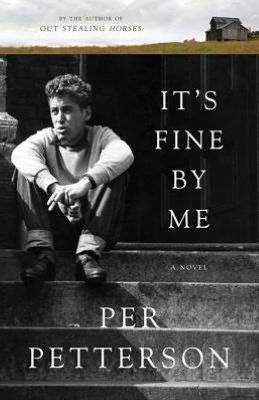Book Review: Per Petterson’s “It’s Fine By Me” — A Sensitive Tale of a Lost Boy
It’s Fine By Me is the story of so many lost boys in literature, who run, who rebel, who are crushed, or luckily find their way.
It’s Fine by Me by Per Petterson. Translated, from the Norwegian, by Don Bartlett. Graywolf Press, 199 pages, $22.
By David Mehegan
Since Uranus begat Cronos and Cronos begat Zeus, sons have struggled against crushing and overbearing fathers. That struggle appears at first to be the theme of Norwegian Per Petterson’s novel, It’s Fine By Me. But it’s not quite so simple.
Though it is new to American readers, one can’t call this a new work because it was first published in Norway 20 years ago. However, since Petterson’s Out Stealing Horses became an international bestseller in 2005 (winning the International IMPAC Dublin Literary Award), his backlist is gradually being translated into English and published by Graywolf, a nonprofit house based in Port Townsend, Washington. His I Curse the River of Time (2008) is the only one of two written after Out Stealing Horses to appear in English; two previous books, In the Wake and Siberia have appeared. That leaves four others, going back to 1987.
As does It’s Fine By Me, Out Stealing Horses centered around a mysterious, runaway father, with the difference that the father was known and loved and his loss never quite explained. The situation in It’s Fine By Me is different. In 1970, 18-year-old Audun Sletten lives in a cramped apartment in a tough Oslo neighborhood with his lonely mother, who amuses herself—when she isn’t working—with a bit of whiskey, fleeting romances, old Fred Astaire movies, and recordings of opera singer Jussi Björling. Older sister Kari lives with a boyfriend, with whom she has a baby. Several years before, car-crazy little brother Egil, 15, drowned after driving a Volvo into a river.
The other presence in the story is Audun’s demonic, violent, drunken father, who beats his family even when sober, keeps a pistol, and more than once shoots up the house. Tormod Sletten is revealed in Audun’s narration, which bounces back and forth between his present (told in the present tense) and childhood (in past tense). Though he hangs over the story like a stalled hurricane in whose eye the other characters live, Tormod is absent from the present since his wife had left him some time earlier. It is not clear where he is, in fact. Like many such characters in literature, from Huckleberry Finn’s Pap or Bill Sikes in Oliver Twist, Tormod Sletten’s cruelty and drunkenness seems to be the only thing to know about him. Though I say he is revealed, in fact we learn nothing about his past, his work, or any of his thoughts or motivations. He seems to exist solely to terrify and torment his family.
Audun is a hard-shelled kid who speaks with unvarnished bluntness and coldness to everybody, including teachers and school officials, the priest at his brother’s funeral, and his luckless mother. He rises early to deliver newspapers before school. He has one close friend, Arvid Jansen (who appears in some of Petterson’s other books), an anti-Vietnam War activist. When a group of local bullies beats up Arvid’s father en route home from work, Audun finds the ringleader drunk in a bar, drags him out in the street, and beats him. Of course he is repaid later in kind.
Despite his toughness—he never has a kind or tender word and shows no feeling save anger—Auden is a decent sort with no tolerance for phoniness or injustice. Besides avenging the beating of Arvin’s father, he helps a local girl find her drug-addled brother. He devours guy fiction by such writers as Jack London and Ernest Hemingway. The text of his English class is the Anglo-American Reader. “The English in it is tiresome, with a faint taste of bog water at the edges,” he says, “but the American has a sky above it that I feel comfortable with.” As in Out Stealing Horses, American popular culture has a strong presence in this novel, from Davy Crockett to Bob Dylan to Audun’s tragic hero Jimi Hendrix. Audun refers derisively to Kari’s boyfriend as James Dean.
Audun is lonely but not alone—he is surrounded by people. In the present of the novel, about the only thing that changes in his life is his quitting school to work in a printing plant. He has no girlfriend, no plans, and it seems no future. He doesn’t do drugs and drinks but little. Nevertheless the story is taut throughout. Audun has seen his father, and there is no telling when or how he will reenter the story. Given what we see of Audun’s fearlessness, explosiveness, and refusal to back down from injustice, we read and wait for the confrontation that we know must come. He dreams of his father, as if he were a kind of forest troll. And yet, the reappearance of Tormod, while it provides a kind of denouement, is not what we expect, and Audun’s ultimate reaction to it is a complete surprise—though not unhinted at in his responses to other older men. I found it to be as true as it was unexpected.
Having not read Knut Hamsun, I cannot assess Petterson’s acknowledged debt to the Norwegian master’s style. But his writing recalls the atmosphere of such American writers as Cormac McCarthy, Thomas Savage, Raymond Carver, or Annie Proulx. One does or does not do, and how one feels about it doesn’t much matter. Descriptions are plain and yet at times lyrical without being purple (an epithet Arvid dismissively applies to a piece of writing Audun likes). Englishman Don Bartlett’s translation is decidedly British—no surprise—and American readers may need a British slang dictionary when they encounter such a phrase as “I’m skint”—i.e., broke.
Though it takes place in and around Oslo, but for the Norwegian names, It’s Fine By Me could as well be happening in Leeds or Cleveland or Baghdad. It is the story of so many lost boys in literature, who run, who rebel, who are crushed, or luckily find their way. I was reminded as I read this story of All Will Be Well, the 2005 memoir of Irish writer John McGahern, whose father was as monstrous as Tormod Sletten, though not a drunk. There are many ways to escape such a bully. McGahern once told me, “I never raised my hand to him, and so he never had power over me.”
Tagged: Graywolf Press, It's Fine By Me, Norwegian, Per Petterson



